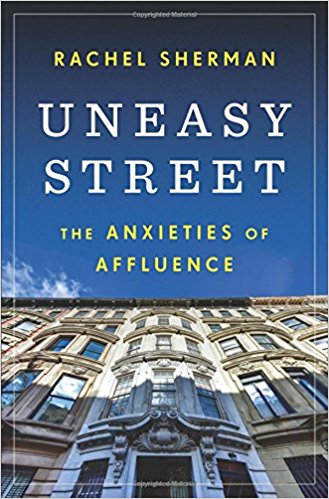You have /5 articles left.
Sign up for a free account or log in.
 Uneasy Street: The Anxieties of Affluence by Rachel Sherman
Uneasy Street: The Anxieties of Affluence by Rachel Sherman
Published in September of 2017.
What binds the affluent of NYC and the growing numbers of non-tenurable alternative academics on U.S. campuses? Worry. Anxiety. An obsession with those with greater privilege and security. And a tendency of some of us question our existential place in our respective communities.
Rachel Sherman’s Uneasy Street is a masterclass in the insights possible through both rigorous qualitative research.
Uneasy Street is a closely observed study of how the urban rich view money - and the relationship between money and parenting, marriage, and politics. More interestingly, Uneasy Street enables those of us who are perhaps less curious about the lives of the rich to understand how class privilege is formed, protected, and replicated in the US.
I’ve long thought that there are not enough sociologists writing books for non-academics. Certainly too many economists (behavioral and otherwise), but nowadays too many psychologists and political scientists. Uneasy Street makes a compelling case for the utility of classic sociological research methods in making sense of the social and economic world that we have constructed.
The sub-culture that Sherman analyzes in Uneasy Street consists of the wealthy of NYC. These are families with household incomes well over $250,000 (usually much more), and wealth (outside of home) of $1 million or more (again, usually much more). Amongst the ~50 families in her sample were wealthy earners and even wealthier inheritors, with the earners predominantly clustered in finance and banking.
Sherman drew her sampling frame from those families undergoing significant renovations of the NYC apartments, 2nd vacation houses, and suburban homes. A plurality of her interview subjects were well-off women who had left the paid labor market to focus their professional energies and skills on raising kids and managing their families.
Again, you may think that you are not very interested in the lives of the NYC rich. This should not deter you from engaging with this book, as the themes that Sherman explores have greater universality than may be immediately obvious. The worries about money, relative status, and earned privilege can hold a mirror up to the status hierarchy of academic work.
The worries about economic resilience of those in academia who do not enjoy the job protections afforded by tenure - or even the possibility of ever accruing these protections - mirror the anxieties of many NYC professionals with high incomes in volatile financial and technology industries.
Sherman has done us all a great service by putting class at the center of her scholarship. She is largely unafraid to break deep social taboos and ask direct questions about earnings, inheritances, assets, and housing values. She is willing to unpack how money impacts everything from marriage to parenting, friendships to political views. In taking the thoughts and fears of the wealthy seriously, Sherman helps us all understand how growing economic inequality is interpreted and ultimately bolstered by the few at the ends of the income and wealth distribution.
The sociological lens that Sherman brings to understanding social class in NYC through the lives of wealthy renovators could be profitably aimed at academia. We need at least some of our sociologists to help us make sense of the class structure of higher education. Themes of earned and assumed privilege run through academe. Worries about our place in the system, and our ability to absorb exogenous shocks while living out our values, unite those at every rung of the higher ed academic hierarchy.
Can you recommend any good sociological studies of stratification, culture, and economic relations within higher ed?
Are you thinking about, or have you ever lived through, a big renovation project?
What are your reading?




